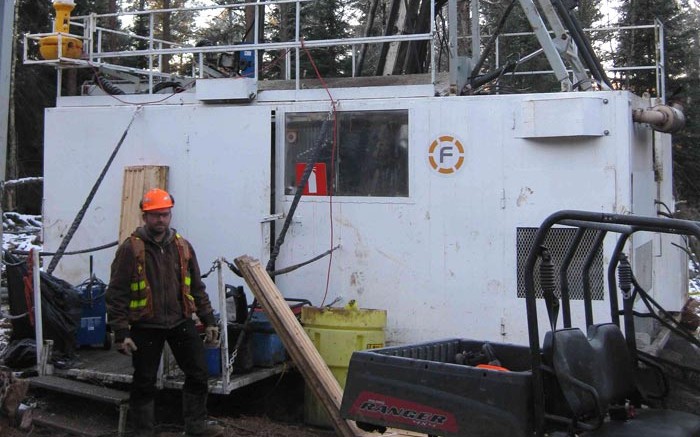In April the Northwestern Ontario Prospectors Association awarded the Bernie Schneiders Discovery of the Year Award to joint-venture partners Transition Metals (TSXV: XTM; US-OTC: TNTMF) and Impala Platinum Holdings for their discovery in November 2013 of the platinum-rich Sunday Lake deposit, 25 km north of Thunder Bay in northern Ontario.
The property was discovered as part of a five-year alliance. Assay results from the discovery hole in November 2013 — 20.2 metres grading 3.22 grams per tonne of platinum, palladium and gold (PGMs), including 3 metres of 5.37 grams per tonne PGMs — were announced in January 2014.
By August the partners had drilled 5,100 metres in 11 holes. Highlights include 15 metres returning 2.84 grams per tonne PGMs, including 8 metres containing 3.85 grams per tonne PGMs and 5 metres of 5 grams per tonne PGM, with 1 metre of 9.75 grams per tonne PGM.
The property covers a 3.5 km diameter, circular, reverse-polarized magnetic anomaly associated with the large buried mafic-ultramafic intrusion interpreted to be Proterozoic in age and related to the Mid-continental rift (MCR), the companies say. The MCR is a 2,000 km long geological rift in the centre of North America that formed when the North American craton began splitting apart 1.1 billion years ago.
Scott McLean, president and CEO of Transition Metals, says Sunday Lake is similar to Lundin Mining’s (TSX: LUN; US-OTC: LUNCF) Eagle mine in Michigan; Rio Tinto (NYSE: RTP; LSE: RIO) and Talon Metals’ (TSX: TLO) Tamarack project in Minnesota, and Panoramic Resources (US-OTC: PANRF) and Rio Tinto’s Thunder Bay North project.
“PGM properties are difficult to find around the world and this is a brand-new discovery, and there are examples of this style of mineralization in the district [the Midcontinental rift] that include Eagle, Tamarack and Thunder Bay North,” he says. “We were already bullish on the price of platinum going forward.”
Transition Metals has a 25% free-carried interest until it finishes a bankable feasibility study. “It’s a pretty nice deal for a small junior — I don’t know of many other ones like that right now,” McLean says, who spent 23 years at Falconbridge Canada Ltd. (including one year at Xstrata Nickel). While at Falconbridge, he managed exploration investment for Sudbury from 2001–2007 as a regional geologist.
The two companies plan to initiate a $350,000 program by October that will include drilling, geophysics and mapping.
The Sunday Lake project is one of 25 gold, copper, nickel and platinum projects that Transition Metals, a project generator, has in Ontario, Nunavut, B.C., Minnesota and Saskatchewan.
“Project generators have multiple projects and they like to find partners to help fund the projects so they can avoid issuing equity,” McLean says. “We prefer to sell interests in the assets rather than equity in the company … and at the end of the day if we do everything right, we’ll be involved in multiple discoveries in which we may only have a minority stake, but we will have kept individual shareholders owning a larger share of the pieces of the pie.”
McLean and colleague Kevin Stevens, Transition Metals’ chief geophysicist, were given the Prospector of the Year Award in 2004 by the Prospectors & Developers Association of Canada for the Nickel Rim South mine, now owned by Glencore (LSE: GLEN).


Be the first to comment on "Transition Metals and Implats to resume drilling at Sunday Lake"